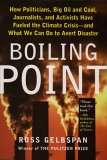Summary | Excerpt | Reviews | Beyond the Book | Readalikes | Genres & Themes | Author Bio
How Politicians, Big Oil and Coal, Journalists and Activists Are Fueling the Climate Crisis--and What We Can Do to Avert Disaster

Critics' Opinion:
Readers' Opinion:
First Published:
Jul 2004, 272 pages
Paperback:
Nov 2005, 304 pages
 Book Reviewed by:
Book Reviewed by:
BookBrowse Review Team
Buy This Book
Ironically, just weeks earlier, Bush's EPA administrator, Christine Todd Whitman, had warned him in a memo that he must demonstrate his commitment to cutting greenhouse gases or risk undermining the standing of the United States among its allies. 'Mr. President, this is a credibility issue for the U.S. in the international community. It is also an issue that is resonating here at home,' she wrote in a March 6, 2001, memo. 'We need to appear engaged.'
Her fears were well founded. Bush's withdrawal from the Kyoto process created the impression that Bush '[is] hawkish, unilateralist and may appear in some areas isolationist,' according to Helmut Sonnenfeldt, a European affairs specialist at the Brookings Institution.
That perception moved from the diplomatic corridors to the streets a few months later when tens of thousands of demonstrators mounted a massive protest in Genoa against the Bush withdrawal from the Kyoto process.
The demonstrators' anger at the United States was noted by several foreign leaders, including a skeptical Jean Chrétien, prime minister of Canada. Noting Bush's promise to provide an alternative plan to the Kyoto mechanism, Chrétien said he would listen to an American proposal but 'was not waiting for it.' Regardless of the substance of any proposal by the Bush administration, Chrétien vowed that Canada would proceed to ratify the protocol.
Added French president Jacques Chirac: 'The elected leaders of our countries have to consider the problems that have brought tens of thousands of our compatriots, mainly from European countries, to demonstrate their concern, to demonstrate their wish to change.'
Despite U.S. intransigence, however, the Europeans continued to pursue a policy to slow global warming. In 2002, the EU voted to ratify the Kyoto Protocol, and European commissioner Margot Wallström warned that the pressure was now on the United States, the world's biggest single emitter of greenhouse gases, to step up to the challenge. 'The European Union urges the United States to reconsider its position,' she said.
The ratification by the European Union followed a declaration, eighteen months earlier, that the EU would get most of its reductions from new renewable energy installations rather than from the dubious and less reliable mechanism of international emissions trading. In November 2000, French environment minister Dominique Voynet declared that the core position of the EU was to ensure that countries made most of their emissions cuts through domestic action rather than through trading emissions credits. She demanded a tight limit on the use of so-called carbon sinks--forests, grasslands, and other forms of vegetation that absorb carbon--for countries to meet emissions reduction targets.
That relatively uncompromising position set the tone for a major conference in Johannesburg two years later, the World Summit on Sustainable Development (WSSD). In preparing for the summit, leaders of countries in Europe and elsewhere declared that a global switch to clean energy needs to be at the heart of any major reversal of the growing--and perhaps irreversible--environmental degradation of the planet.
Their agenda, as the WSSD approached, centered on plans both to boost renewables and to revive what was already quickly becoming a moribund Kyoto process.
But the United States made clear a month before the summit what its position would be. As Senator James Jeffords (I-VT) made clear, the White House would try to 'keep global climate change off of the agenda' at the Johannesburg meeting. Jeffords, a Vermont Republican turned Independent who chaired the Senate's environmental panel, bemoaned the fact that the administration would send a small, lower-level delegation to Johannesburg in an effort to 'narrow the scope of the discussions.'
From Boiling Point by Ross Gelbspan, pages 93-126 of the hardcover edition. Reprinted with Permission from Basic Books – Copyright 2004.





The Funeral Cryer by Wenyan Lu
Debut novelist Wenyan Lu brings us this witty yet profound story about one woman's midlife reawakening in contemporary rural China.
Your guide toexceptional books
BookBrowse seeks out and recommends the best in contemporary fiction and nonfiction—books that not only engage and entertain but also deepen our understanding of ourselves and the world around us.